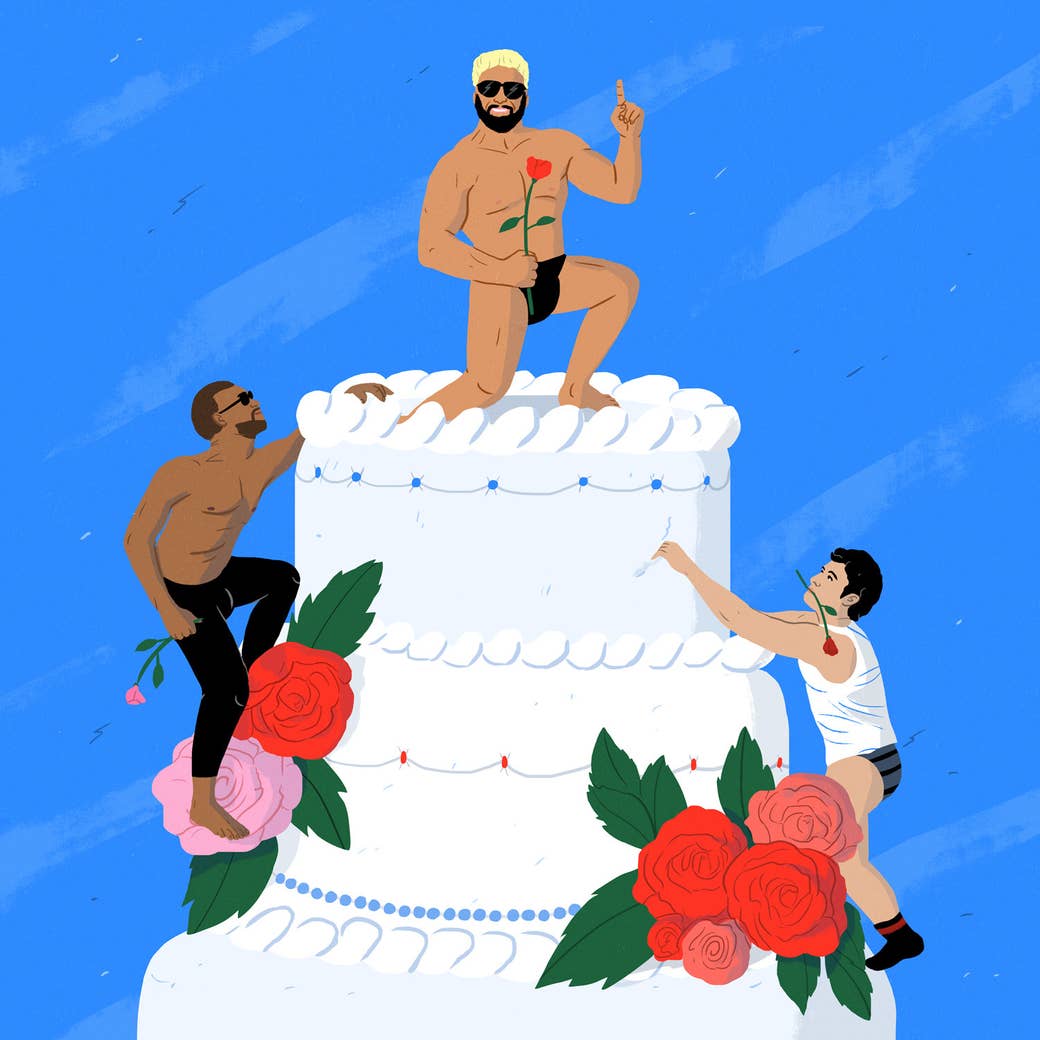
Last season of The Bachelor ended with a twist and a bang after protagonist Arie Luyendyk Jr. dumped his chosen bride-to-be, contestant Becca Kufrin, on camera. In an unprecedented move, he ultimately proposed to the runner-up, becoming one of the franchise’s most infamous villains but also setting up the arc for the current season of The Bachelorette. This iteration of the show was designed to — finally — give Kufrin the televised happily-ever-after of her dreams. The motto accompanying the unveiling of her official Bachelorette portrait was her own no-nonsense catchphrase: “Let’s do the damn thing!”
But, as usual, most of the best drama and comic relief on this season of The Bachelorette, the show’s 14th, has come not from Becca herself but from the antics of and squabbles among the men who are (theoretically) there to vie for her affection. Whether it was contestants Chris and Lincoln fighting during a public debate in front of Virginia’s governor about how the latter fat-shamed the former behind the Bachelorette's back, or the simpler spectacle of male model Jordan — beloved for the dumb blonde broetry of his mystifying and grammatically innovative Jordanisms — walking across the house in tight gold underwear (as a prelude to unveiling his “deeper” side to Becca), the show’s theater of petty masculinities is unlike anything else on television.
So much of reality TV in particular — from The Bachelor itself to Basketball Wives to The Real Housewives — is generated through scenarios that, on some level, pit women against one another. The plotlines on these shows focus on the castmates’ endless cycles of fighting and making up; the women involved are often framed as gossipy, jealous, and exhibitionistic, and their antics are often maligned as irrational or bitchy, behaviors culturally imagined as feminine. (On The Bachelorette, the men often accuse each other of acting like a “bitch” or pulling a “bitch move.”)
But The Bachelorette flips the usual script of reality television, and the culture at large, by forcing its men — usually uber-masculine Ken dolls — into a competitive male harem that brings out their pettiest instincts and deepest insecurities. They have to try to outmaneuver each other, spilling other contestants’ dark or embarrassing secrets, without turning off the Bachelorette herself. In the show’s rom-com fantasy world, they must always say the right thing, perform their vulnerability, be willing to expose their bodies — even undergo that most unspeakable horror of straight American men’s nightmares: wearing a Speedo. And so the end result is a one-of-a-kind combination of conventional, heteronormative (if situationally polyamorous) romance coupled with a mostly unintentional commentary on masculinity, akin to a butch bro version of RuPaul’s Drag Race.
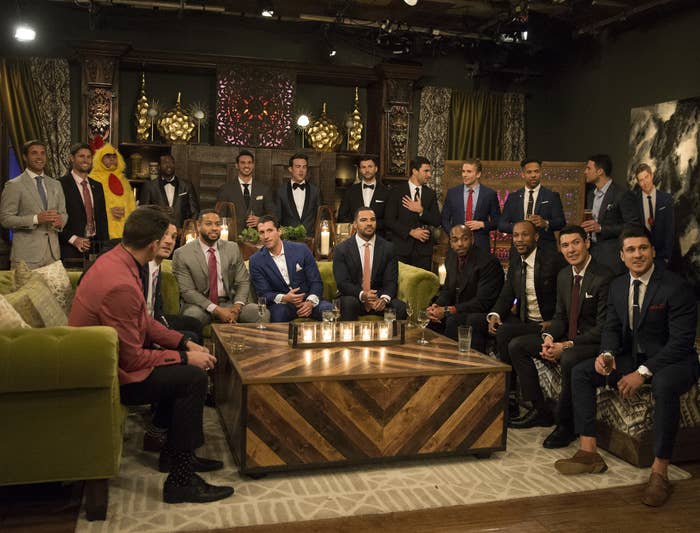
The Bachelorette’s contestants are meant to represent a wide array of archetypes, and are plucked from across a diverse spectrum of occupations and backgrounds (if not racial identities), ranging from Princeton grads to erectile dysfunction experts, or more debatable occupations, like this season’s “colognoisseur.” Yet — not unlike in gay porn — producers seem to love jobs that involve strenuous physicality, like welders and farmers, former football players (there were two this season), and personal trainers. The show has so many trainers, in fact, that they started rebranding some of these contestants as “business owners” or “entrepreneurs,” a favorite catchall job title.
Each contestant’s journey begins when they step out of a limo (or a minivan) and introduce themselves to the Bachelorette, a momentous occasion that involves varying degrees of awkwardness and a predilection for cheesy metaphors. “I know there are a lot of fish in the sea,” one contestant told Bachelorette Ali Fedotowsky (now Fedotowsky-Manno) while reeling her in with an actual fishing rod, “and I really hope I'm the one for you." They use all kinds of props — a chicken costume, the Spanish language, even their own cute children — to make a big first impression.
But through most of each season, until the final few men develop more serious relationships with the Bachelorette, the show devotes as much time to the contestants hanging out, chatting, and fighting with one another as it does to their interactions with the woman they’re trying to impress. Whether decompressing in the show’s mansion or killing time between dates in international hotels, they size each other up and critique their opponents’ “peacocking,” as one peacock put it this season. And this is where some contestants inevitably forget the rules of the Bachelor universe, where the antics that make for the best TV almost always spell doom for the people enacting them.
The antics that make for the best TV almost always spell doom for the people enacting them.
The most common squabbles are generated by the now-iconic accusation — once turned into a terrible rap video on the show itself — that some people are “not here for the right reasons.” This sometimes means that a contestant is suspected of deliberately angling to be the next Bachelor, now that the franchise picks them from former Bachelorette contestants. Or they might be trying to use the show as a launchpad to minor league fame and fortune — like Wes, who serenaded Bachelorette Jillian Harris with a (ultimately sad for the wrong reasons) country love song to promote a not-yet-existent music career. In a tirade after getting dumped, he admitted he already had a girlfriend; this was also the case with “entertainment wrestler” Justin “Rated R” Rego (who had not one but two girlfriends) — most memorable because he was on crutches when he got exposed as a cheater and had an awkwardly hard time hobbling away from an indignant Ali Fedotowsky and the producers’ cameras.
Guys with secret girlfriends are a big drama generator, not least because one of the pleasures the show provides is watching the Bachelorette figure out which of them are “good guys” and which aren’t, and then seeing two-faced players get their comeuppance. But part of the comedy also comes from the men trading, sometimes transparently, on the codes of masculine chivalry. They police each other about Right Reasons — and what might constitute disrespectful behavior against the Bachelorette — in a way that feels motivated less by their relationship with her than by their relationships with one another.
If a woman is “not here for the right reasons” on The Bachelor, it feels less high-stakes, because for so long the rules of dating and courtship have been stacked against women. The men of The Bachelorette seek a moral high ground by declaring it all a necessary part of "protecting Becca,” but as in most homosocial triangles, these fights are often about the men’s big egos clashing against each other. This season, for instance, the aforementioned male model Jordan and the chicken-suit-wearing contestant David went on a two-on-one date where their cross-talking attempts to bring each other down — David told Becca that Jordan saw her as someone he would settle for, playing on her fears about Ari — finally exasperated her, and they were both kicked off.
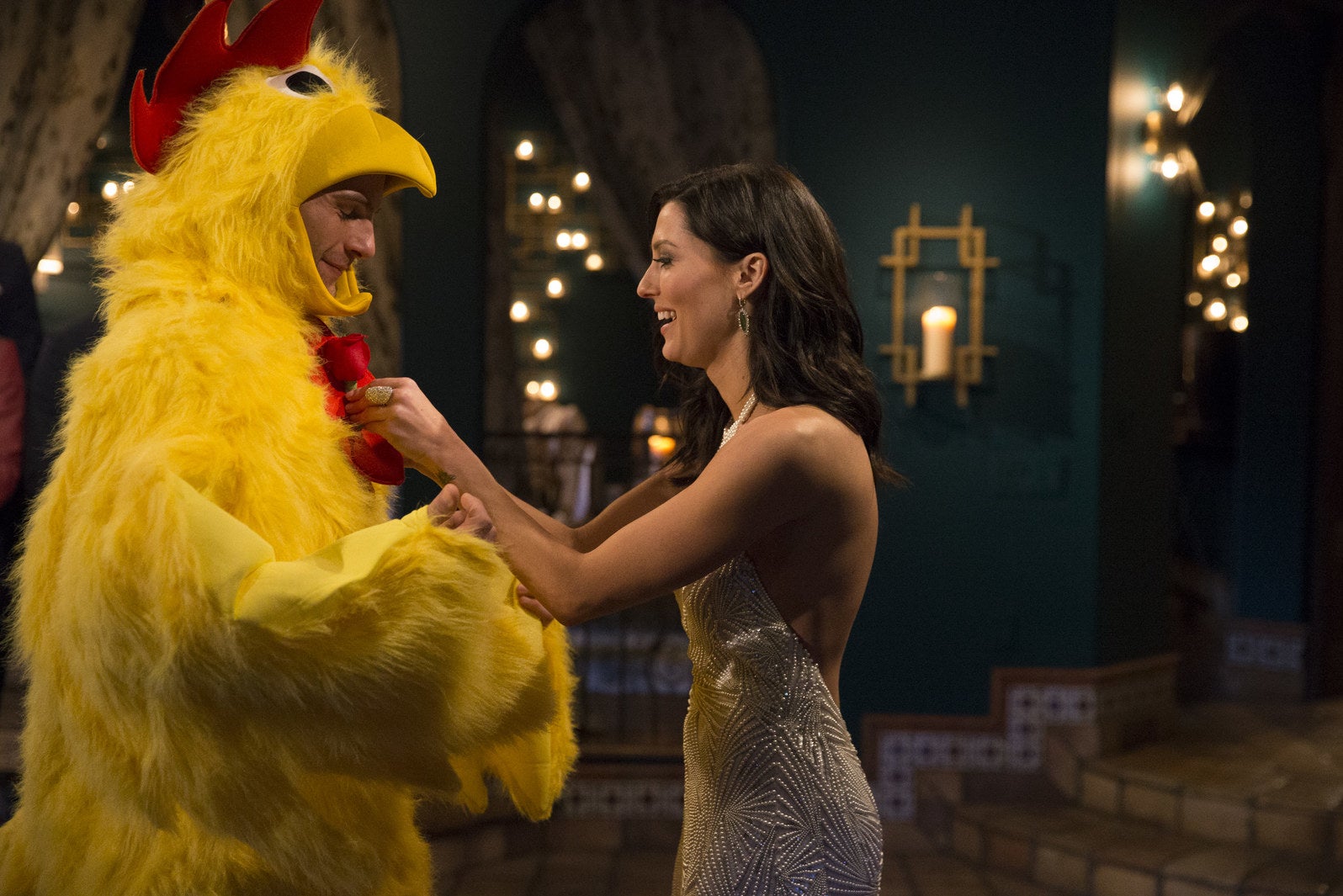
These aren’t the only storylines that get traction in the show’s landscape of fratty misbehavior. Sometimes a contestant becomes a villain just by rubbing the others the wrong way with a macho-fied version of the “not here to make friends” trope. One of the most memorable recent bad guys was gel-coiffed meathead Chad Johnson, whose inflated ego was as big as his engorged biceps. He antagonized the other contestants on JoJo Fletcher’s season and annoyed them by keeping to himself, breaking his self-imposed isolation only to hang out and work out with Daniel, his lone Canadian bromance partner. The show got a lot of comic mileage out of Chad’s constant protein intake — whether through shakes, vast quantities of cold cuts, or by chomping on an entire sweet potato with the gusto of a muscled Fred Flintstone.
It all became slightly less funny after fellow contestant Evan, the aforementioned erectile dysfunction expert, jokingly alluded to Chad’s (unimpressive) genital size, leading to a big kerfuffle and bleeding knuckles after Chad punched a door. (The producers kept him on but showily hired security guards to keep the set safe.) The inevitability of violence popping up at some point during each season of Bachelorette, sometimes played for humor, has no equivalent on The Bachelor, and speaks to how ingrained violence and conflict is in our basic understanding of masculinity. It takes a lot — a Chad-level outburst — to cross the line of what seems like too much. Otherwise, scuffles are treated as boys being boys, and neither Chris Harrison nor the show’s viewers generally seem concerned that a contestant who's threatening other guys or punching walls is also going on dates with the Bachelorette. (Histories of violence outside the show also seem to regularly bubble up; this season, a background check on contestant Lincoln somehow failed to turn up a past conviction for indecent assault.)
Instead of shootouts at high noon, The Bachelorette gives us sexier scenarios that allow for maximal shirtless exposure.
Chad was ultimately just one incarnation of the Bachelorette’s love for spectacles that tease the erotics of channeled testosterone. Every season involves staging what are basically male duels, featuring all the Bachelors competing against each other to get the elusive one-on-one time with their desired damsel. Instead of shootouts at high noon, The Bachelorette gives us sexier scenarios that allow for maximal shirtless exposure for all the contestants: sumo wrestling (which involved plenty of butt exposure, and one of the contestants also had trouble keeping his balls in place, which led to constant blurring), boxing, football matches, and, most exciting of all, men’s mud wrestling.
These are helpful because the show loves a wounded man — both in the sense of men made vulnerable through prior dating or life experiences, but also the more literal injuries that these competitions result in, like a hurt wrist during a football game, a concussion from a boxing match, or, as with the chicken-suit wearer, randomly falling out of a top bunk in the middle of the night. All of these elicit sympathy and attention from the Bachelorettes, who usually seem concerned but also flattered by these displays of brawny masochism. The anachronistic quality of the show’s hyper-gendered world of manly activities and feminine passivity is part of what allows it to be enjoyable as camp.
Those competitions also function, as mentioned, to provide eye candy. From the earliest seasons, the show’s contestants have primarily been square-jawed and conventionally handsome in a Men’s Health style, like a televised Abercrombie & Fitch catalog on steroids. The release of their bios each season now sends tabloids on a hunt for their shirtless pics, though some of the earlier seasons feature men with less bulging bodies, like weatherman Jonathan, who was self-conscious and faced comments about “chicken legs” when he had to wear a Speedo for a sexy calendar photo shoot on Season 6.
The joke about “who has to wear the Speedo” is another recurring motif that comes up among the men whenever there are beach scenes, or photo shoots, or the Mr. America pageant held during Desiree Hartsock’s season. It all reached a kind of apogee that same season, when the video shoot for the “all the right reasons” song involved contestant Brandon parading his Speedo-clad bulge — “nut-hugging” was one blogger’s description — in front of Desiree and shaking it around for the video, and he forgot his lines because of the other men’s nervous jokes and snickering. This past week, the discussion of Jordan’s tiny gold underwear took up almost an entire section of the latest “Men Tell All” reunion episode, as the other men very earnestly criticized his willingness to expose himself as betraying a lack of romantic seriousness, which seemed to say more about their own discomfort with male bodies than Becca’s — since she took the joke in stride.
Still, The Bachelorette is also a space where straight male vulnerability is taken seriously. Many of the contestants cry while revealing painful histories, and publicly talk about and process some of their most private struggles with unavailable fathers, or complicated divorces. All of this is depicted in a very different register than the portrayals of stoic or mysterious straight white men in “prestige” television dramas. This season, for instance, Blake told Becca during his “hometown date” about the trauma of witnessing a school shooting as a teenager, while his mother talked about his panic attacks after a previous heartbreak. This kind of open embrace of masculine emotion is rare in the television landscape, whether scripted or reality.
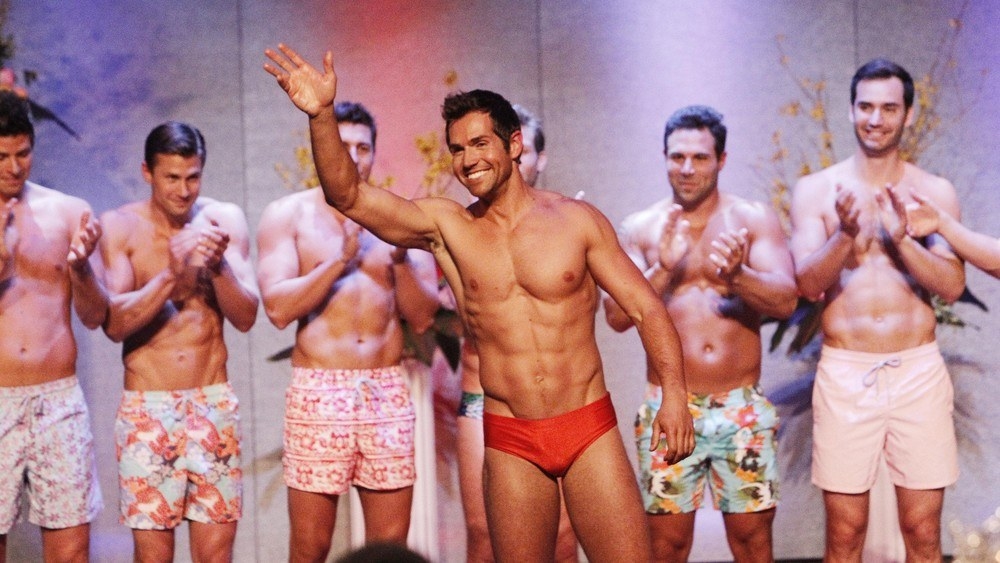
The Bachelorette is still a show designed primarily for a straight, white audience, and when it engages with identities outside of that it almost always stumbles, often in quite calculated ways. With all the shirtless mud wrestling and group workouts, the show has long teased the lines between bro bonding and homoeroticism. But on one occasion, the producers very deliberately manufactured a faux-gay frisson between the infamous “Brokeback Bachelors” — Clint and JJ — on Kaitlyn Bristowe’s season, in 2015.
Their relationship was teased as an actual gay love story, and the other men all joked that the pair seemed to be more into each other than into the Bachelorette. Though the two men came out as straight on social media, the editing at least portrayed them spending countless moments in the hot tub, even alluding to popping each other’s pimples, and at one point JJ joked about wanting to get head from Clint. “I never thought that I’d meet somebody like that,” Clint says in one of his confessionals. “Falling in love with a man never crossed my mind.”
The escalation and unraveling of their friendship remains one of the most compelling representations of bro-on-bro action ever captured on tape, and the show’s host Chris Harrison insisted on framing it as ambiguous. But the show ultimately participated in the basest kind of queer-baiting, treating the possibility of gay romance as a joke. (And sadly reminding us of Logo’s attempt to actually create a gay Bachelor, which didn’t even remotely live up to the glossy promise of the original.)
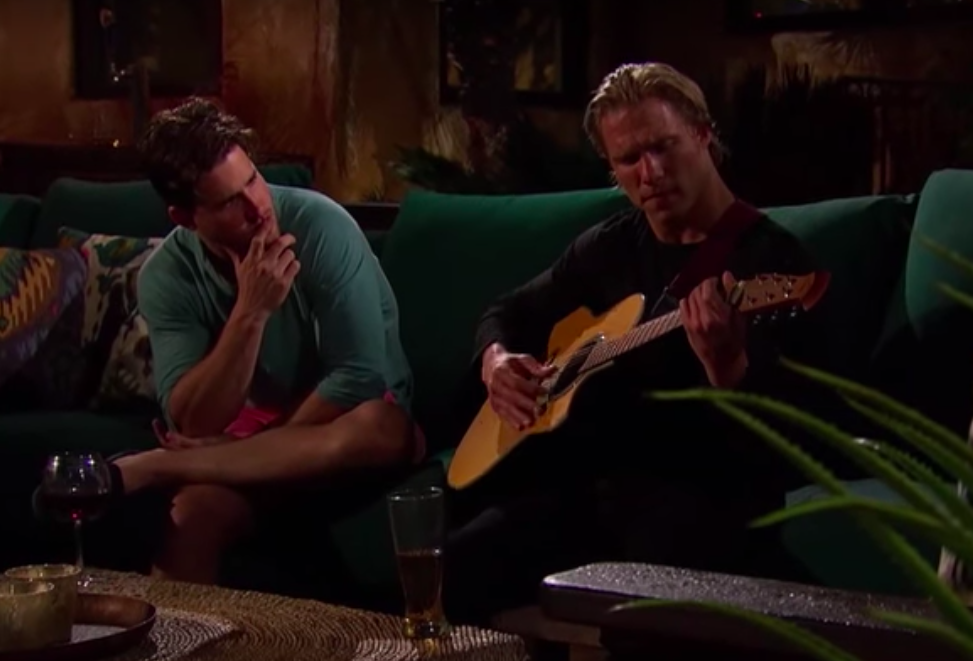
The show is most tone-deaf, by far, about race. Last season it featured an ongoing fight between white country singer Lee and black wrestler Kenny, which was treated as basically just another dramatic confrontation. Eventually one of the other white contestants, Dean, did point out Lee’s racism: “The only people that I’ve seen Lee pick fights with have not been the people he’s used to seeing on a daily basis, from a cultural perspective,” he told a producer in one confessional interview. But Lee wasn’t confronted with this until after the show, when racist tweets from his past were dug up, and he was forced to address it on the “Men Tell All” special. That fight — as far as I know the first time the show ever “explicitly” (by its own standards) made something “about race” — was strategically included in the season that revolved around the first black Bachelorette, Rachel Lindsay, as if she owed the show the labor of publicly dealing with racism more than any of the white women who preceded her.
This season, Colton Underwood, a former football player and now the most famous adult male virgin in the country since Tim Tebow, responded to Wendy Williams’ shady diss with his own racially coded retort. Becca’s favorite, Garrett, was exposed by former Bachelor contestant Ashley Spivey for liking anti-immigrant, body-shaming, and anti-trans content (including a conservative conspiracy theory about Parkland shooting survivor David Hogg) on Instagram, leading to calls that the show allow the Bachelorette to check social media. You could argue that in airing (intentionally or not) the dirty laundry of “America’s most eligible bachelors,” the show is becoming a kind of Trump-era reality check for some viewers about the banality of white supremacy among the country’s straight white men.
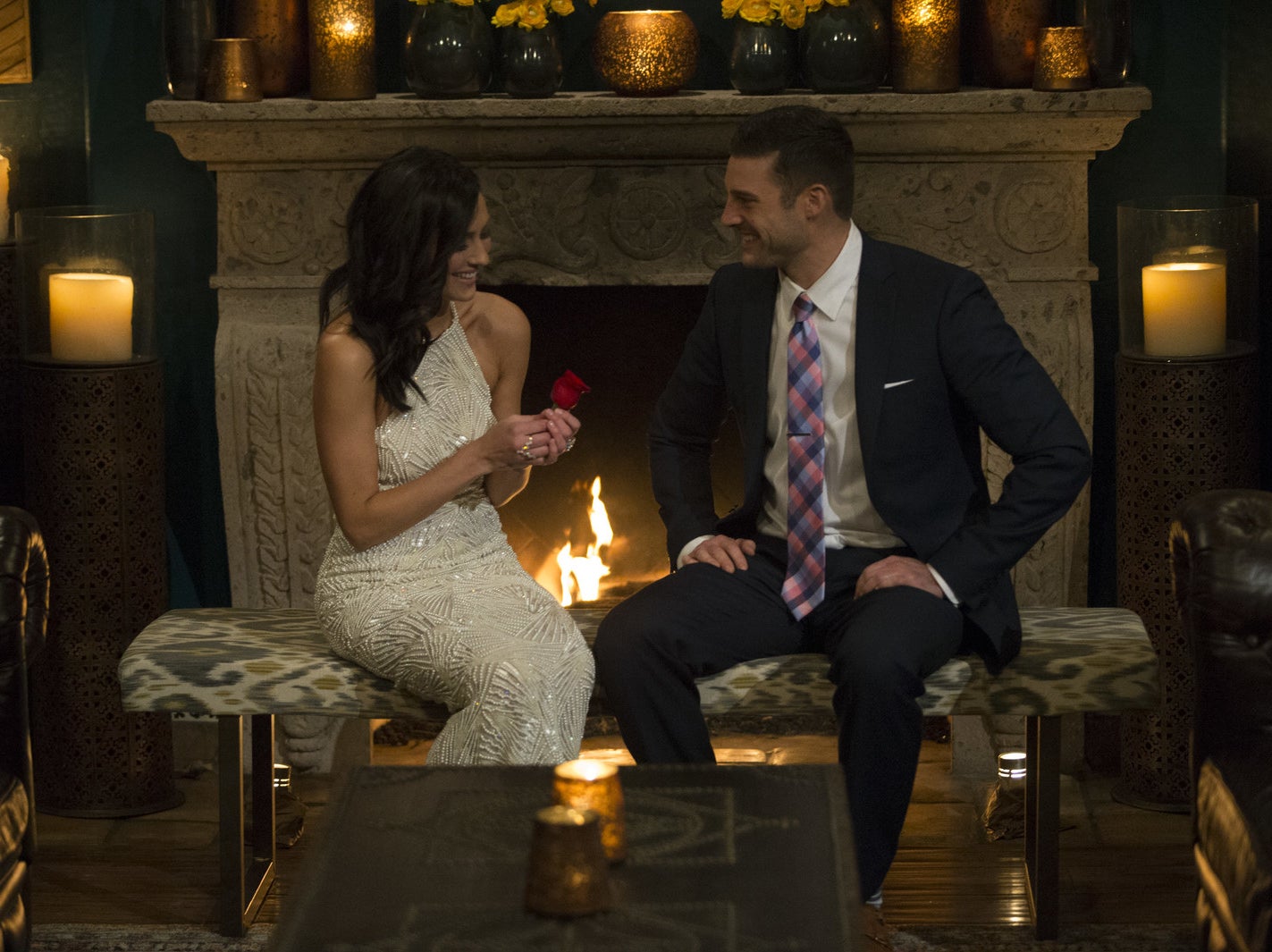
In many ways, The Bachelorette waffles — often problematically — between idealizing male vulnerability, exposing toxic masculinity, and making comedy out of a “bros will be boys” ethos. And the Bachelorette herself is set up as a kind of arbiter of these questions.
Early in each season the majority of the guys are playing caricatures, but by the end there are at least two or three that we're supposed to take seriously and consider "good" enough for the woman at the center of it. This season offers an interesting contrast between Kufrin’s two finalists, with each man representing a kind of contradiction in himself: In the finale, airing Monday, she will choose between Blake — a classically hunky former high school football star who is also sweet and vulnerable and has clearly been to therapy — and Garrett, who presents himself as a trustworthy family man but seems, if his social media habits are any indication, to embrace questionable values.
The Bachelorette bills itself as a love story, but as we all know, the personal is political. Some might dismiss the show’s comedic strategies or controversies because of its fantasy packaging, but perhaps that’s just because — not unlike those Speedos — it exposes truths that hit too close to home for comfort. ●
